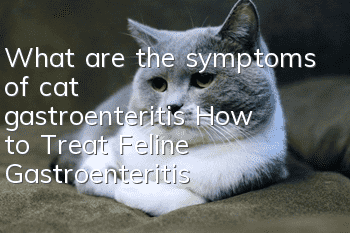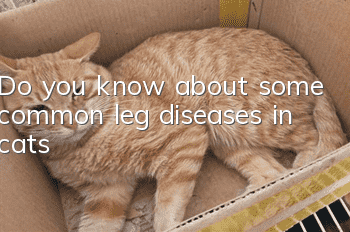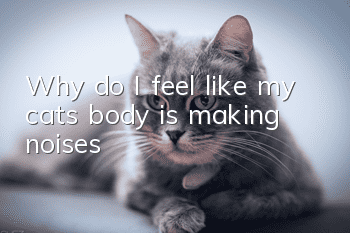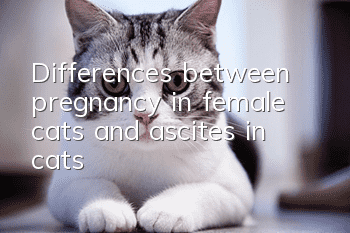What are the symptoms of cat gastroenteritis? How to Treat Feline Gastroenteritis

Analysis of the causes of cat gastroenteritis
Feline gastroenteritis refers to acute or chronic inflammation of the mucosa of the cat’s stomach, small intestine, and colon, resulting in clinical symptoms such as vomiting, abdominal pain, and diarrhea. Cat gastroenteritis can also be divided into two main symptoms: gastritis and enteritis. So, what exactly causes cat gastroenteritis?
1. Due to eating spoiled food or indigestible items, such as hair, plastic toys, paper scraps, etc.;
2. Bacterial or viral infections, such as Salmonella, Escherichia coli, viral gastroenteritis, etc.;
3. Intestinal parasitic diseases (such as roundworms, coccidia, tapeworms, toxoplasmosis, etc.) and stress reactions can cause gastroenteritis.
Clinical symptoms of cat gastroenteritis
1. If the cat has gastroenteritis, which is mainly gastritis, the patient will be in poor spirits at the beginning of the disease, with a slight increase in body temperature, decreased appetite, vomiting, abdominal pain, constant review of the abdomen, thirst and drinking a lot of water, and vomiting after drinking; in severe cases, Vomiting is frequent, the vomit is yellowish watery, foamy, or even bloodshot, and the body loses weight rapidly.
2. If gastroenteritis is mainly enteritis, diarrhea is the main symptom, and the feces is like drainage, or it is difficult to defecate when one wants to defecate, there is pus and blood in the stool or it is jelly-like, and the feces is fishy smell.
Treatment methods for cat gastroenteritis
The main clinical manifestations of cat gastroenteritis are vomiting, diarrhea, abdominal pain and other symptoms. To treat cat gastroenteritis, you need to prescribe the right medicine. First, you must understand what causes cat gastroenteritis, and then antivomiting and diarrhea.
1. For those with severe vomiting, fast for 24 hours. For those with diarrhea, do not feed indigestible food. Feed oral rehydration solution in small amounts and multiple times with saline. At the same time, intramuscular injection of Gastroin, gentamicin, dexamethasone, and vitamin B1 was performed, 1 to 2 times a day, for 2 to 3 consecutive days to cure the disease. Then use the gastrointestinal digestive agent Guden Probiotics to help the gastrointestinal recovery.
2. For gastroenteritis caused by overeating, you should stop eating for 1 to 2 days, but you should ensure adequate drinking water, and take Guden probiotics at the same time, 1 to 2 tablets each time, twice a day.
3. For enteritis caused by viruses (viral gastroenteritis) or bacteria (E. coli, etc.), apply Viralin, Haida, vitamin B6, and dexamethasone intramuscularly respectively, 1 to 2 times a day, continuously 2 to 4 days.
4. For gastroenteritis caused by parasites such as vomiting, pulpy or bloody stools, antivomiting, diarrhea, anti-inflammation and hemostasis should be taken first. The above antibiotics can be used for treatment. After the gastroenteritis symptoms disappear, then For deworming, take albendazole at a dose of 5 mg per kilogram of body weight orally, once a day for 3 days to achieve symptomatic treatment.This purpose. In addition, if there is bleeding, intramuscular injection of Hemostasis or Anluoxue should be added to stop the bleeding.
- What should I do if my cat has diarrhea and blood in his stool?
- How long does it take for male cats to lose hormones after being neutered?
- Why does Garfield never gain weight but always lose weight?
- What medicine is used to deworm cats externally?
- What to do if there is cat moss next to the cat’s mouth
- Can Ragdoll cats eat eggs if they have diarrhea?
- Can stray cats eat pears?
- Can kittens eat chicken breasts?
- Do I need an injection if I am scratched by a pet cat and bleed slightly?
- Cat with gastroenteritis no longer vomits but won’t eat



